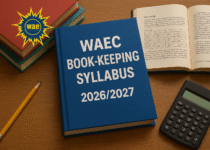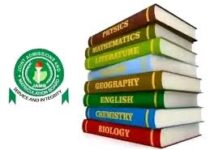WAEC Arabic Syllabus 2026/2027 & Textbooks
The WAEC Arabic Syllabus 2026/2027 covers three papers: Paper 1 (Oral Arabic), Paper 2 (Essay, Comprehension, Translation, and Lexis & Structure), and Paper 3 (Literature). The literature component focuses on specific recommended textbooks, with authors and works like Al-Mutanabbi and Hafiz Ibrahim featured in the 2026-2030 syllabus. The grammar and structure portion of the syllabus includes topics such as noun characteristics, plurals, verb conjugations, and derivatives.
Scheme Of the Examination
The exam consists of three papers. Paper 1 and Paper 2 will be taken together, while Paper 3 is separate.
Paper 1 is the Objective section, lasting 50 minutes, and covers comprehension, Arabic translation, and grammar. The total score for this paper is 25%, with 15 marks allocated to comprehension (7.5%), 20 marks for translation (10%), and 15 marks for grammar (7.5%), for a total of 50 marks.
Paper 2 is the Theory section, lasting 2 hours, and focuses on composition and literature. The total score for this paper is 60%, with 40 marks allocated to composition (24%) and 60 marks for literature (36%), for a total of 100 marks.
Paper 3 is the Oral section, lasting 15 minutes, and tests students’ speaking and pronunciation skills. This section is worth 15% of the total exam score, with a total of 30 marks.
WAEC Arabic Syllabus 2026/2027
WAEC ARABIC SYLLABUS | ||
| SN | TOPICS | OBJECTIVES |
| PAPER I: OBJECTIVE | ||
| 1 | COMPREHENSION | 15 questions will be set based on 3 Arabic passages of about 70 words each on topics within the experience of the candidates with 5 multiple-choice questions on each passage. The comprehension carries 15 marks |
| 2 | TRANSLATION | The Arabic text for translation must deal with things which the candidates are familiar with. The texts must have essential vocalization and punctuation. The translation carries 20 marks. |
| 3 | GRAMMAR | Parts of Speech i. Nouns, pronouns, singular, dual, sound and broken plurals as well as relative and demonstrative pronouns. ii. Gender: masculine and feminine. Prepositions and construct phrases. iii. Adjectives, conjunctions, the permutative and the emphatic. iv. Verbs: The perfect, the imperfect and the imperative. v. Particles governing imperfect verbs: Nominal and verbal sentences vi.Kanna, Inna, Zanna and the respective associates. vi. Transitive and intransitive verbs, the five verbs and conjugation of verbs. Numbers (from one to one thousand.) Transitive and intransitive verbs, the five vii. Active and passive voices. viii. The verbal noun, the active participle, the passive participle, the elative and special adjectival forms. |
| PAPER II: THEORY SECTION | ||
| 4 | COMPOSITION | The composition in Arabic will be about 120 words. Four essay topics will be set; one of then should be fornal or informal letter. Only one of the topics should be chosen. Consideration will be given to orderly and coherent presentation of ideas, use of appropriate diction and style, as well as correct spelling, punctuation and grammar. The type of the essay will be narrative, descriptive, argumentative or in the form of a dialogue. The composition carries 40 marks. |
| 5 | LITERATURE | There will be five questions in this part spread over the four periods of Arabic Literature. Candidates will be required to answer four questions in all-a compulsory question and any other three |
| PAPER III: ORAL TEST | ||
| 6 | ORAL TEST | The test will include: ا عبد الله بن محمد بن فودي : تزيين الورجات المطبعة جامعة إبان . مرتضى بر ماضي مستقبل اللغة العربية في نيجيريا دار النشر الإسلامية لا غموس ٩٧ دام احمد الإسكندري والآخرون : المفصل في تاريخ الأدب العرية الأول والثانى ) وزارة المعارف العمومية القاهرة. زكريا حسين : المادية الأدبية الطلاب العربية في تغرب افريقيا دار النور او |
WAEC Arabic Textbooks 2026/2027
- ا عبد الله بن محمد بن خودی : تزيين العرينات مطبعة جامعة اب
- مرتضى برماضي المستقبل اللغة العربية في نيجيريا دار النشر الإسلامية لا غموس ٧ عام
- احمد الإسكندري والآخرون : المفصل في تاريخ الأدب العديد : الأول والثاني ) وزارة للعارف العمومية – القاهرة . زكريا حسين المادية الأدبية الطلاب العلامة في الحرب افريقيا دار النور اولشان.
- RECOMMENDED TEXTBOOKS
- (A) COMPOSITION, COMPREHENSION, TRANSLATION AND ORALS
- ا سید حمزة مالك : المرشد في الانتماء العربي والكتابة
- الأول والثاني، دار النشر الإسلامي لا غموس ۱۹۸۲. اسحاق أو غنبيه القصص الشعبية من السلحفاة
- عند اليوريا وبين ، آبادن وكنو.
- محمد بديع شريف وسلیم حکیم والحاج حسین آدم: العربية الجديدة في نيجيريا الكتاب الكالة او تعمال النجا لا تموید
- قاموس جيد عربي – انجلين وعربي
- (ANMAR
- المحمد أجروم الصهابي : متن الاجرومية – القاهرة
- على الجازم ومصطفى أمين : النحو الواضح المدارس المرحل الأولية الجزء ١-٢ المعارفي القاهرة .
- محمد عبد العليم حجاب : العربية الحديثة الجزء السم دار الشعر الإسلامية، لا تموس.
- I.A., B Balogun and Z.I Oseni: A Modern Arabic Course Book 1, Lagos. Islamic Publications Bureau 1982.
- David Cowan: Modern Literary Arabic, London: Cambridge University Press and Lagos. I.P.B
- J.A Haywood and H.M Nahmad: A New Arabic Grammar of the Written Language. London Lund Humphries, 1965.
- TRENDING BLOG POST:
- WAEC Syllabus For Economics 2026/2027 & Textbooks
- WAEC Auto Electrical Work Syllabus 2026/2027 & Textbooks
- WAEC Syllabus For Animal Husbandry 2026/2027 (ALT A) & Textbooks
- Waec Syllabus For Agricultural Science 2026/2027 & Textbooks
- WAEC Syllabus For Mathematics 2026/2026 Texbooks


